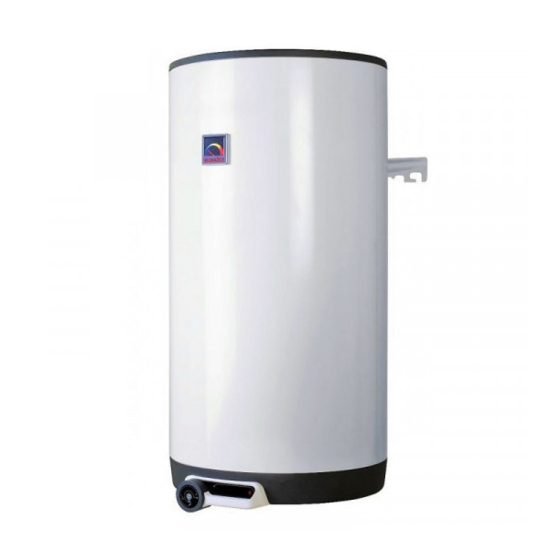Drazice OKC 100/1m2 Kullanım ve Kurulum Kılavuzu - Sayfa 6
Su Isıtıcı Drazice OKC 100/1m2 için çevrimiçi göz atın veya pdf Kullanım ve Kurulum Kılavuzu indirin. Drazice OKC 100/1m2 12 sayfaları. Tank-type water heaters for vertical mounting

valve must be mounted on the inlet pipes, preventing spontaneous heater draining and hot water penetrating back
into the water main.
We recommend that the hot water distribution from the heater was as short as possible to minimise heat losses.
Heaters must be provided with a discharge valve mounted on the cold service water inlet to the heater (Fig. 2)
for potential disassembly or repair.
When assembling the security equipment, follow ČSN 06 0830.
8.
CONNECTION OF COMBINED HEATER TO HOT WATER HEATING SYSTEM
(Fig. 1, 2)
It is recommended to install stop valves on the heating water inlet and outlet (for possible dismantling of
the heater). The valves have to be as close to the heater as possible to avoid higher thermal losses.
9.
ELECTRIC INSTALLATION
The electric wiring scheme is attached to the water heater on the side of the electric installation guard (see also Fig.
6).
Connection, repairs, and wiring inspections may only be implemented by a company (person) authorised to such
activity.
Expert connection must be confirmed on the warranty certificate.
The heater is connected to the 400 V/50 Hz electric network using a fixed moving conductor with a switch that
turns off all network poles and the circuit breaker (protector).
Installations in bathrooms, laundromats, rest rooms, and showers, 33 2000-7-701 must be obeyed.
The degree of protection of electric parts of the heater is IP 45.
Respect the rules of protection against electrical injuries in accordance with ČSN 33 2000–4-41.
10.
PUTTING THE HEATER INTO OPERATION
After connecting the heater to the water main, hot water heating system and power supply, and after checking the
safety valve (following the instructions attached to the valve), the heater can be put into operation.
Procedure:
a)
Check both water and electric installation; for combined heaters, check the installation to a hot water
heating system. Check proper placement of operating and safety thermostat sensors. The sensors must be
inserted all the way in; first the operating and then the safety thermostat.
b)
Open the hot water valve on the combination faucet;
c)
Open the cold water inlet valve to the heater.
d)
As soon as the water starts running through the hot water valve, the heater is filled and the valve closes.
e)
In case of a leakage (flange lid), we recommend fastening the flange lid bolts.
f)
Fasten the electric installation cover.
g)
In case of service water heating by electric energy, turn on the electricity (for combined heaters, the heating
water valve at the heating water entry to heating insert must be closed).
h)
When heating service water with electric energy from the hot water heating system, turn the electricity off
and open the valves of heating water input and output, possibly de-aerate the exchanger.
i)
When commencing operation, flush the heater until the cloudiness in the water is gone.
j)
Make sure to fill in properly the warranty certificate.
11.
HEATER CLEANING AND ANODE ROD EXCHANGE
Repetitive water heating causes limestone sediment on both the tank walls and chiefly the flange lid.
The sedimentation depends on the hardness of water heated, its temperature, and amount of hot water consumed.
We recommend checking and cleaning the tank from scale and eventual replacement of the anode rod after
two years of operation. The anode life is theoretically calculated for two years of operation; however, it changes
with water hardness and chemical composition in the place of use. Based on such an inspection, the next term of
anode rod exchange may be determined. Have the company in charge of service affairs clean and exchange the
6
